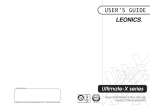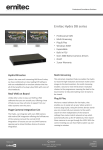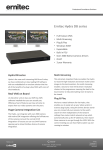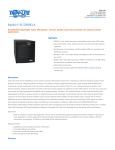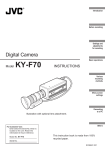Download Ultra Start 650 Series User`s guide
Transcript
-1- SAFETY INSTRUCTIONS CONTENT SAFETY INSTRUCTIONS INTRODUCTION FRONT AND REAR PANEL INSTALLATION OPERATION UPS STATUS DISPLAY TROUBLE SHOOTING SERVICE BATTERY REPLACEMENT INPUT FUSE REPLACEMENT STORAGE AND PRESERVATION SOFTWARE INSTALLATION 1 4 10 16 19 21 27 30 31 33 34 34 Please read carefully and follow this ULTRA Series UPS guide. Important : Please keep this user's guide for reference in order to use the UPS properly and safety. This user's guide contains instructions for installation, operation and specifications. For product safety, please check this product annually by our service qualified personnel or if there are any symptoms of problems which are not mentioned in this guide or an queries, please contact your LEONICS local distributors,LEONICS Service Center, send e-mail to [email protected] or visit www.leonics.com. For your convenience and quick reference for our service, please fill the requested information in the blanks below. UPS Model : __________________________________ Serial Number : __________________________________ Purchased date : __________________________________ Purchased from : __________________________________ Caution Risk of electric shock, DO NOT remove cover. No user serviceable part inside, please refer servicing to qualified service personnel. 1.1 Electrical Safety 1.1.1 1.1.2 1.1.3 1.1.4 Do not work alone where there are electrically hazardous conditions. Contact with live conductors will cause burns and dangerous electric shock. Only qualified electricians allow to install and wiring this unit and the system. Periodically check your cable, terminal and power source to make sure that they are in good condition. 1.1.5 To reduce risk from electric shock if you can not find the electrical ground ( ) of the building, unplug the UPS from the AC source before plug in your load at the rear side of the UPS. Then, plug in the UPS to AC source. -2- 1.1.6 Do not touch any metal parts or any electrical connection when UPS is operating. 1.1.7 Use ONLY one hand when plugging and unpluging the load in order to avoid electric shock from touching two surfaces with different potential. 1.1.8 It is recommended to connect the UPS to a three wire AC source (two live wires and ground) which connects to a protected circuit such as employs a fuse or circuit breaker. -3- 1.3 Warning ! Battery Safety 1.3.1 Although the UPS is not connected to any power source, its outlets may be energized because it has a battery inside. 1.3.2 The UPS has hazardous voltages inside, do not disassemble any parts of UPS except for the battery. Users are not allowed to repair, recondition or disassemble the UPS. This must be done by Leonics qualified technicians only. 1.2 CAUTION ! Safety guide for installation and operation 1.2.1 Before installing or using this unit, read all instructions, caution markings on the UPS and all connected load, and all sections of this user guide. 1.2.2 Install this unit in a temperature and humidity controlled indoor area with adequate air flow and away from chemical particles or flammable substances . Avoid installing the unit near radio transmission station, heat dissipation equipment and direct sunlight. 1.2.3 This unit has ventilation grills. Ensure that sufficient ventilation is provided. DO NOT block the ventilation grills. 1.2.4 Use insulated tools to reduce your risk of electric shock. 1.2.5 Remove all jewelry or other metal objects such as rings, necklace, bracelets and watches when installing this product. 1.2.6 Properly wiring the cables as shown in the wiring diagram. 1.2.7 Before connecting the communication interface signal cable, Turn off the UPS by pressing the front panel button until the Utility Line OK/Fail ( ) and Overload Alarm ( ) lamps are lit at the same time and the alarm sounds once. Then, release the button. 1.2.8 Turn on the UPS before turn on the load to prevent surge from the loads. 1.2.9 DO NOT connect utility power to the UPS OUTPUT. This may cause the UPS damaged. 1.2.10When heavy rain, avoid using electronic equipments including UPS to prevent it from lightning. 1.2.11Use soft cloth to clean the UPS when it is turned OFF. DO NOT clean it with solvent. 1.2.12DO NOT use the UPS with life recovery instruments. The failure of UPS may cause life recovery instruments failure or effect to their performance or effect to the safety system of those instruments. This product contains sealed lead acid battery and must be recycled properly. For recycling please return it to a LEONICS local distributor or LEONICS Service Center or contact your local recycling center for proper disposal information. 1.3.3 Do not dispose of batteries in a fire. They may be exploded. 1.3.4 Do not disassemble batteries. They contains poisonous electrolyte which is harmful to your skin and eyes. 1.3.5 Replace batteries with the same type and rating and follow the proper battery replacement procedure. 1.3.6 When replacing a battery, use tools with insulated handles and remove any watch, rings or other metal objects that you wear in order to avoid electric shock. 1.3.7 If user has to keep the UPS or does not use if for long time, recharge the battery every 3 months in order to preserve the battery. To recharge the battery, connect it to the AC utility and turn on the UPS for 8 hours. Load : UPS VA Option : : : Vocabulary Any electrical equipment which is connected to the UPS and gets power from the UPS such as a computer, printer, fax machine or modem. ULTRA Series UPS The unit of UPS power rating showing its capacity. The additional function or device that is not supply with standard product. -4 - -5- INTRODUCTION The ULTRA Series UPS can be started when there is no power source. It is convenient for you to have spare power when the source fails or in an emergency. It also can communicate with a computer through the Easy-Mon X Monitoring and Management Software (sold separately) via USB or RS-232 (for some model) port . This software can monitor the UPS and AC source status on PC that connected directly to UPS. It allow user to schedule on-off the UPS, schedule self-test and data log. It also can monitor the UPS and AC source status of the UPS in the network through Easy-Mon Netview Manager (sold seperately) and alarm the blackout status on computer server to client computer in the network through Easy-Mon Alert (sold seperately). 2.2.1 Operating in the normal mode The ULTRA Series UPS is a compact, light weight and attractively designed uninterruptible power supply for office automation equipment (computers and peripherals such as monitors, modem, printers, fax machines, etc.). Its major function is to eliminate any power problem such as a black out, brown out, sag, surge, spike, noise, etc. that might cause malfuction of the load causing work interruption. With its Advanced Microprocessor Control, when the UPS detects any abnormal conditions, it will respond instantaneously. It also has special features: Power Watcher, a full time load measuring system, Battery Watcher, the battery capacity checking system, Ultra Fast Charger, providing less than 3 hours charging time without shortening battery life and Perfect Ultra Display, which shows the current status of the UPS ( load level, input voltage level, battery level, battery replacement condition and overload condition) and Advanced Load Outlet Management (ALOM), which the user can program to turn off a low priority outlet when there is a low battery or overload condition (for 1050VA or higher only). For the UPS with LED display and EASY display, LED lamps represent the messages or status. For the UPS with LCD display, the messages or symbols show on LCD screen. 2.2 ULTRA Series UPS Operation 2.1 General -7- 2.2.2 Operating under backup mode -6- 2.2.1 Operating in the normal mode Normally, UPS is working under line interactive mode in which the path of current is as follows : When the current first flows into the UPS, it has to pass through a surge protection circuit to filter surges and spikes which may occur from a nearby lightning discharge or load switching by the local power company. Here, the high voltage power will go to the line grounding system and let only the acceptable current pass to the EMI/RFI filter to eliminate EMI and RFI. Then it flows to the automatic voltage regulator (AVR) to regulate the voltage level to approximately your country's standard nominal mains voltage (see product specification, 100, 110, 120, 220, 230 or 240 Volts). If the voltage is too high or too low compared to the standard nominal voltage, it will be adjusted to the safety level for your loads (please refer to the specifications). After that the current will flow to two destinations. The first part goes to the EMI/RFI attenuation then to the Power Watcher and to your connected loads. The Power Watcher provides information about load conditions, whether or not you are overloading your ULTRA Series UPS. (Power Watcher is continuously monitoring in real time both for the stabilizer and inverter modes.) The remaining power flows to the battery charger circuit to charge the batteries and maintain them fully charged. 2.2.2 Operating under backup mode The UPS will transfer to backup mode (inverter mode) when it detects abnormal situations such as blackouts, brownouts, surges, sags or abnormal frequency. These situations may harm your loads and may be too risky for the UPS to operate in the interactive mode. When an abnormal power mode is detected, the UPS will Immediately transfer to the backup mode with no loss of power to the loads. At this moment, the backup power will begin to be drawn from battery. The current from the battery will flow to the inverter (changing direct current to alternating current). Then, the power flows to the EMI/RFI attenuation, Power Watcher and on to your loads. You can also monitor the UPS from a PC by using Easy-Mon X Monitoring and Management Software through a connection between the PC and the UPS communication port. For instance, you can set the UPS shutdown time and restart time, this status will be displayed on your PC monitor. -8- 2.3 Features Advanced LEONICS Microprocessor control: A specially programmed microprocessor produced only for LEONICS is used as the CPU for the UPS. This makes the ULTRA Series UPS perform faster and more accurately to protect valuable equipment and its peripherals and provides advanced control features. Power Watcher: Full time load power monitoring and battery charge warnings are provided to make sure that your UPS will be able to properly backup power to the PC protected by UPS. "Power Watcher" helps users know in real time that they are not overloading their UPS. With this useful feature you can increase loads as much as you want until the UPS overload warning is shown. (LEONICS suggests that for highest reliability and safety that you should connect loads at no more than 75 % of rated UPS power. This allows for loads that change power level during use and provides for some reserve backup power for some loads.) Battery Watcher (Battery Replacement Indicator): Every time ULTRA Series UPS performs a self-test and when the battery has been fully charged, it will perform a battery condition evaluation to determine whether the battery used by the ULTRA Series UPS is still good or should be replaced. The battery replacement indicator will show when the battery should be replaced. Ultra Fast Charger: This UPS features an advanced, 3 stage charger (Bulk Boost - Float) to shorten charging time without harming the battery. Besides fast charging, UPS also maintains the proper charging voltage to preserve the battery from self-discharge and to make sure that it is always fully charged and ready to provide backup power to your PC. Intelligent Battery Management (IBM): The intelligent battery management system will manage charging and discharging to get longer backup times and prolong battery life. Advanced Load Outlet Management (ALOM): This feature allows the user to preset operation of the "Intelligent Channel" via Easy-Mon X Software. The user can preset the intelligent output channel to cut off power to low priority loads when the UPS is overloaded, over temperature or has a low battery (available on 1050 VA or higher model only). -9- Hot Swappable Battery: The user can replace the battery even when the UPS is running and without turning off the computer as long as mains power is available. Surge Protection for Telephone Line: Surge protection protects equipment data from surges that come from telephone line (RJ11). Surge Protection for LAN Line (option): Surge protection protects equipment data from surges that come from LAN line. These special sockets can accept either telephone plugs (RJ11) or LAN plugs (RJ45). Perfect LED Display (depend on model): Attractive outlook with full function LED display. It shows load level, input voltage level, battery level, battery replacement condition and overload condition. Perfect LCD Display (depend on model): Attractive outlook with full function LCD display. It shows load level, input voltage level, battery level, battery replacement condition and overload condition. Easy Display (depend on model): Simple outlook with easy function display. It shows utility line status, battery status and load status. Multi-function switch : Single switch with 4 functions, very convenient to users : 1. Turn on / Turn off UPS 2. Mute audible alarm 3. Self-test switch 4. Switch display mode (For the UPS with LED display only.) Extend Backup Time (option): It extends the battery unit to increase the duration of UPS backup time. It can protect data with extra effectiveness. Inverter temperature sensor (option): When the UPS is operating under backup mode, the inverter temperature sensor will check the temperature inside inverter and warning when the temperature is too high. You should reduce the load immediately. Automatic voltage regulator -37% to +30%. buck and double boost (option) : With it’s especially wide range automatic input voltage regulator, from –37% to +30%, UPS can lessen backup mode transferred transaction, which helps you save the battery‘s energy for emergencies, it also prolongs your battery life. (This optional is special for specific models, please see your features on the side of the carton). - 10 - - 11 - FRONT AND REAR PANEL 3.1 Front panel EASY DISPLAY LED DISPLAY LCD DISPLAY 3.1.1 Multi-function Switch: The switch to turn on, turn off, test the UPS and mute the audible alarm. For LED Display UPS, you can press it to change the display mode from input voltage - load level mode to battery voltage level mode and vice versa. 3.1.2 Utility Line OK / Fail (Lamp no. 1: green): Shows the utility power status. Lit : UPS is operating under its normal mode. Blink : UPS is operating in the backup mode. Note: 1. For the UPS with inverter temperature sensor (option) ; It will be blink fastly when the temperature in inverter is very high. 2. For 1050 VA or higher model, if the Intelligent channel is turned off, it will blink slowly (on 1.3 seconds, off 0.2 second). 3. In backup mode, the lamp no.1 and no.8 will be blink twice every 1.5 second. 3.1.3 Low Battery / Replace Battery (Lamp no. 2: yellow) Lit : Battery need to be replaced. Blink : Battery low, UPS is about to run out of power (in case of working in - 12 - 3.1.4 3.1.5 3.1.6 3.1.7 3.1.8 backup mode). Overload Alarm (Lamp no. 3: red): Shows load status. It will be lit when your connecting loads are exceeding the UPS capacity. Load Level: Shows how much power your loads are consuming compared to the UPS capacity from low to high level. 3.1.5.1 For the UPS with LED display (Lamp no. 4-7:green): Each lamp represents 25% of full load capacity and starts from Lamp no. 4 to 7. Please refer to section 6.2 The meaning of LED display. 3.1.5.2 For the UPS with LCD display: Each bar represents 25% of full load capacity and starts from the thin bar to the thick bar. Please refer to section 6.3 The meaning of LCD display. Input Voltage: Shows the normal mode or stabilizer mode status. 3.1.6.1 For the UPS with LED display (Lamp no. 8-11: green): One of 4 lamps lights or blinks only at a time. Please refer to section 6.2 The meaning of LED display. 3.1.6.2 For the UPS with LCD display: One of 4 symbols lights or blinks only at a time. Please refer to section 6.3 The meaning of LCD display. Battery Level: Shows the battery voltage from low to high level. 3.1.7.1 For the UPS with LED display (Lamp no. 4-11: green): Shows battery voltage presents by lamp no. 4 to 11 from low to high level. In normal mode, these lamps show load level and input voltage. The display changes to battery level display only when switch display mode or the UPS is supplying backup power from battery. To switch to battery level display, please refer to section 5.5 Switch display from input voltage - load level to battery voltage level or vice versa. (Please refer to section 6.2 The meaning of LED display.) 3.1.7.2 For the UPS with LCD display: Each bar represents backup power in the battery which from the thin bar to the thick bar. Thin bar stands for low battery and 5 following bars represent 20% of full power each. (Please refer to section 6.3 The meaning of LCD display.) Replace battery: Indicates replace battery status (for UPS with LCD display). Replace the battery when this messages and Low Battery/Replace Battery lamp lights. - 13 - 3.2 Rear panel description - 14 - 3.2.1 Surge protection for telephone line / LAN line (option): A port for fax / modem line surge protection. Its function is to protect load against voltage spikes coming from the telephone or LAN line (option). 3.2.2 No Load Shutdown Switch: Allows you to select whether the UPS will shutdown itself when power line fail if there is no load or not (no load are defined as all loads that connected to the UPS are less than 8 percent of UPS capacity). 3.2.3 USB Port or RS-232 port (option): The communication port for connecting the UPS to PC. The signal from the UPS will send information to the PC through this port via USB cable or RS-232 cable (option) and display data on Easy-Mon X Monitoring Software. 3.2.4 Full time surge protection output for laser printer: The outlet that connects surge protection circuit. This socket is for Laser Printer or other high power consumption devices such as scanner. There is no backup power from this outlet. 3.2.5 UPS output : Loads supplied from these outlets are full time monitored under Power Watcher. They are provided for the loads that the user wants to protect and provide a back up power supply when there is a power failure. Loads may be added until Power Watcher warns of an overload. (LEONICS suggest to connect load at no more than 75 % of UPS rated power for safety and enough backup power for those loads that need irregular power.) For 1050 VA or higher model, the UPS output has two channels as follows. 3.2.5.1 Main Channel: The main outets that is always connected to the UPS backup system. It is provided for high priority electrical equipments such as a computer or server. 3.2.5.2 Intelligent Channel: A supplemental outlets that the user can manage and control by Easy-Mon X Software (See item 12.2). The Intelligent Channel can be set to permanently turn on or can be set to perform in intelligent mode to : 1. Turn on with a delay of 0 - 4,000 seconds after the Main Channel turn on. 2. On commercial power : 2.1 Turn off when there is UPS overload. 2.2 Automatic re-supply after an overload has been removed. - 15 - 3. On Battery Operation : 3.1 Turn off when UPS gets over temperature. 3.2 Turn off when battery is low. 3.3 Turn off when there Is UPS overload. Note: 1. Intelligent Channel is set to permanently 'ON' from the factory. 2. If set the Intelligent Channel to On battery operation mode and disabled, the UPS will re-supply automatically when the utility power returns to normal. 3. Loads which are connected to the Intelligent Channel should be low prioirty such as a printer or scanner. 3.2.6 AC input: The power socket for plug in the input power cord. In Ultra Series UPS 650 VA or smaller, it is the power socket with buit-in fuse holder and spare fuse holder socket. 3.2.7 Fault wiring: A indicator light shows the fault wiring of the utiliy line which connects to the UPS. The fault wiring can be either the wiring of line or neutral are crossed or no electric ground. If this indicator light is extinguished, it means the wiring is correct. 3.2.8 Battery extension port (option): The port for connecting with an extension battery unit to increase the duration of UPS backup time. 3.2.9 Dip switch: The switch for setting the no load shutdown system. The switch no.1 use for enable/disable no load shutdown system. Note: SW 2 - SW 4 are not available at the present. 3.2.10 Magnetic breaker: A circuit breaker that protects the UPS from overload or short circuit current (available on 1050 VA or higher model). - 16 - INSTALLATION - 17 - 4.4.2 IEC type outlets Plug UPS output power cord which is supplied with the UPS into the UPS outlet and the inlet of the load. 4.1 Connect a signal cable from PC network (if available) to the USB port (or RS-232 port (option)) of the UPS. 4.2 Connect telephone line or LAN line (option). IN : Connect telephone or LAN line (option) to UPS. OUT : Connect telephone or LAN line (option) from UPS to the input socket of fax machine, modem or LAN card. Note: To gain proper benefit from telephone or LAN line surge protection, your electricity system should have an electric ground. If there is no electric ground wire, there can be data transferring problems and loss of protection of the connecting devices. 4.3 No load shutdown switch enable / disable ULTRA Series UPS 650VA or smaller ULTRA Series UPS 1050VA or higher Set the dip switch SW1 to "ON" as shown if you want the UPS to shutdown automatically in backup mode when the load is less than 8 % of full rated power in order to save energy and prolong battery life. Note: No load shutdown is set at "OFF" from the factory. 4.4 Plug the UPS loads such as computers, printers, modem and etc to the UPS outlets. 4.4.1 Standard outlets Plug the load power cord into the UPS outlets as shown in the figure below. 4.5 Plug the UPS to utility line 4.5.1 Standard outlets Plug UPS input power cord into UPS's AC Input and wall receptacle as shown in the figure below. - 18 - - 19 - 4.5.2 IEC type outlets Get the input power cord from the load and plug into UPS AC input and wall receptacle as shown in the figure below. OPERATION 5.1 Switch on 5.1.1 Under normal utility power line (AC Start): Plug in the power cord to the electrical outlet. Press the multi-function switch for 0.5 second then release. All indicator lights will blink, after that UPS will start up the self-test (See details in section 5.3.1). When the test is completed the display panel will show the UPS status (See details in UPS Status Display). Note: No input power cord supplied with this UPS. The output power cord is only supplied with this type of UPS. 4.6 In case of battery extension, plug the cable from battery extension module into the UPS battery extension outlet. Caution!: Use LEONICS battery extension module only. 4.7 To set Easy-Mon X software (if available), follow the software installation section. 5.1.2 Under power failure conditions (DC start): Press the multi-function switch until the lamp no.1 ( ) and lamp no.3 ( ) are lit at the same time and the alarm beep sounds once, then release before the second alarm beep sounds. All indicator lights will lit, after that the ULTRA Series UPS will start the seft-test (See details in item 5.3.1) Note: If you press the multi-function switch too long (until the lamp no.1 ( ) and lamp no.3 ( ) are extinguished) and the second alarm beep sounds, the UPS will not start up. LEONICS LEONICS - 20 - 5.2 Switch off Under any operating conditions, there is only one proper way to shut off the UPS. Press the multi-function switch until the lamp no.1 ( ) and lamp no. 3 ( ) are lit at the same time and alarm sound once, then release. Note: If you press the multi-function switch too long (until the Utility line ok/fail ( ) and Overload alarm ( ) lamps are extinguished) and the second alarm beep sounds, the UPS will not switch off. 5.3 Self-test The ULTRA Series UPS has a self-test capability. This complete self-testing function will perform tests of stabilizing, charging, inverter and battery circuit functions (See section 6). There are four cases that the UPS will do self-testing : 5.3.1 Start up self-test When turned on, the UPS will do the self-test automatically. 5.3.2 Manual self-test During operation, if you want to test the UPS, double click the multifunction switch. Then the UPS will do a self-test. 5.3.3 Schedule self-test by Easy-Mon X software With Easy-Mon X Monitoring and Management Software, you can command the UPS to do a self-test instantaneously or periodically. (The user can find more details in the Easy-Mon X software user's guide provided on the accompanying CD-ROM.) 5.3.4 Auto-test every 2 weeks If there is no manual or scheduled self-test during the past 2 weeks, the UPS will do a self-test automatically. You can also set the auto-test duration through Setup Characteristic software. (See "Setup Characteristic" in item 12.2) Moreover, when ULTRA Series UPS do a self-test and detect that the battery has been fully charged, it will check whether the battery need to be replaced. This is the "Battery Watcher" function. - 21 - 5.4 Cancel self-test You can cancel a self-test by double click the multi-function switch. However, if the UPS has reached the inverter testing step, the self-test can not be cancelled (before lamp no. 2 lights.). 5.5 Switch display from input voltage level to load level and vice versa You can switch the monitor by pressing the muti-function switch for 0.5 seconds, then release. (available on LED display only.) 5.6 Mute alarm When the ULTRA Series UPS alarm, you can mute by pressing the multi-function switch for 0.5 seconds then release. 5.7 Schedule shutdown, Restart and self-test: When using with Easy-Mon X Monitoring Software, you can program a scheduled shutdown or restart as you wish. Furthermore, this software also assists you to log self-test results and abnormal electrical conditions and send those data via fax. . UPS STATUS DISPLAY - 22 - - 23 - 6.1 Indicator lights No. 1, 2 and 3 Item UPS status 6.2 The meaning of LED display 1 Lights condition 2 3 Audible alarm Under normal operating mode 1 Normal lit 2 Blackout blink 3 Battery replacement warning 4 Low battery 5 Overload 6 Overload shutdown or output no alarmsound lit blink blink lit short circuit During self-test 7 Stabilizer and charger test 8 Backup and battery test blink no alarmsound blink no alarmsound (After test, if the UPS detected something abnormal, a long beep indicates. To mute the alarm, press the multifunction switch. Schedule shutdown and restart 9 Easy-Mon X software send slow command for shutdown the blink - UPS. 10 UPS is shutdown and waiting slow for restart itself. blink - 6.2.1 Input voltage level and Load level display mode 6.2.1.1 lndicator lights no. 4 to no. 7 show how much power your loads are consuming compared to the UPS capacity. Each lamps represents 25% of UPS capacity. - Lamp no.4 is lit when loads are above 8% and less than 25%. - Lamp no. 4 and 5 are lit when load are between 26% to 50%. - Lamp no. 4, 5 and 6 are lit when load are between 51% to 75%. - Lamp no. 4, 5, 6 and 7 are lit when loads are between 76% to100% - Lamp no. 4, 5 and 6 are lit and lamp no.7 is blink when loads are over 100 % and you should reduce the load immediately. 6.2.1.2 Indicator lights no. 8, 9, 10 and 11 show input utility line voltage level. - Lamp no. 8 is blink twice every 1.5 second when input voltage is between 220 V - 30% to 220 V - 21% (154 V- 174 V). - Lamp no. 9 is lit when input voltage is between 220 V - 20% to 220 V - 11% (175 V - 196 V) - Lamp no. 10 is lit when input voltage is between 220 V - 10% to 220 V + 10% (197 V - 242 V) - Lamp no. 11 is blink twice every 1.5 second when input voltage is between 220 V + 11% to 220 V + 20% (243 V- 264 V). Note: 1. The input voltage range above is the approximately values. 2. The lamp no.1 and no.8 are blink twice every 1.5 second and alarm sound beep when blackout. 6.2.2 Battery level display mode I ndicator lights no. 4 to no. 11 show battery voltage from low (lamp no. 4) to high level (lamp no.11). - Charging battery : the light up lamp show battery voltage at that time. When the battery level is full, the indicator lights are all lit. - Supplying backup power : the blinking lamp show the battery voltage at that time. After supply power for a while, the next lamp will blink because the power runs out. - 24 - 6.2.3 Self-test display mode After the ULTRA Series UPS finishes a self-test, it will display : 6.2.3.1 A short beep and the one of Input Voltage Level lamps (no.4 -7) and Load Level lamps (no.8-11) will lit that means the UPS is normal. 6.2.3.2 A long beep indicates that the UPS has detected something abnormal. To mute the alarm, press the multi-function switch then observe the error from the display : - 25 - 6.3 The meaning of LCD display 6.3.1 Input Voltage Level Display The symbol blinks twice every 1.5 seconds when utility line voltage is very low. The symbol is lit when utility line voltage is low. The lamp no. 4 is lit when a stabilizer fault. The symbol is lit when utility line voltage is normal. The lamp no. 5 is lit when a charger fault. The symbol blinks twice every 1.5 seconds when utility line voltage is high. The lamp no. 6 is lit when a software failure. 6.3.2 Load Level Display The far-left bar is lit when loads are above 8% (No load) and less than 25%. The lamp no. 7 is lit when CPU error. Two bars are lit when loads are from 26% to 50%. The lamp no. 8 is lit when an inverter fault. Three bars are lit when loads are from 51% to 75%. The lamp no. 9 is lit when self-test is cancelled because of battery power is too low. Four bars are lit when loads are from 76% to 100%. The lamp no. 11 is lit when it need to replace the battery. All bars are lit and the far-right indicator blinks when the connected loads are over 100%. - 26 - - 27 - 6.3.3 Battery Level Display The third indicator is lit when software failure. The far-left bar is lit when battery level is very low. (Low Battery) The forth indicator is lit when CPU error. Two bars are lit when battery level is below 20%. The fifth indicator is lit when an inverter fault. Three bars are lit when battery level is from 21% to 40%. The top indicator is lit when battery power is too low. UPS will cancel the self-test automatically. Four bars are lit when battery level is from 41% to 60%. The "REPLACE BATTERY" shows on LCD display when battery needs to be replaced. Five bars are lit when battery level is from 61% to 80%. TROUBLE SHOOTING All bars are lit when battery level is from 81% to 100%. Symptoms 6.3.4 Self-test display After the self-test finished, it reports as follow 6.3.4.1 The UPS creates a short beep tone and display input voltage level, load level and battery level. These show that the UPS is normal. 6.3.4.2 The UPS creates a long beep tone. Press multi-function switch to stop the beep tone. This means that the faults are detected as follows. The first indicator is lit when a stabilizer fault. The second indicator is lit when a charger fault. Press the multi-function switch, indicator lights no. 2 and 4-11 or LCD screen are lit then, extinguished. But the UPS does not operate. Possible Causes 1. Press multi-function switch too fast. 2. UPS power cord is not plugged into input socket properly. It is too loose. 3. There is no power in the UPS mains power cord. Solutions Repress the switch for 0.5 to 1 second then release. Plug in firmly. Press the switch until the lamp No. 1 and 3 are lit then release ( DC start ). If the UPS still does not operate, please send it to a LEONICS Service Center. - 28 - Symptoms UPS operates normally but the lamp no.3 is blink or LCD display show over load sign on the top bar of load level display UPS operates normally but sounds a short beep periodically or UPS switches to backup power for a short period and returns to normal operating status. When a black out occurs, UPS supplies backup power but it is still supplying when the AC source recovers. Possible Causes - 29 - Solutions 4. If you follow steps 1- 3 and the symptoms still exist, the fuse might be blown. Check fuse holder (for ULTRA Series UPS 650VA or smaller). If fuse is blown, replace with the spare fuse. If the UPS does not operate, please send it to a LEONICS Service Center. Loads which are connected to Power Watcher ( UPS output ) are exceed the UPS rated capacity. Reduce loads to 75%. (please keep the remain 25% available for instantaneous power consumption of the load when it first starts. ) A power sag occurred in too short a period for the user to sense. But UPS can detect that abnormal condition. Do nothing, normal operation. The returned AC source's voltage is too low for ULTRA Series UPS to run in normal operating mode. - Turn off loads and wait until the AC source returns to normal. Then turn on loads again. or - Use backup power from UPS until battery low alarm alerts, then turn off loads and the UPS. Wait until the AC source returns to normal, then Symptoms Possible Causes Solutions turn on loads and the UPS again. or - If AC source is normal, but the UPS still has the same symptom, see solution of the first symptom In this list. UPS operates normally but sometimes the overload alarm alerts. UPS does not supply backup power during a black out and the lamp no. 8 to no.11 are all lit (LED display only). 1. Loads are consuming more power than usual at that time. Often this is caused by a printer when it is printing. 2. Overload may come from a laser printer or another load that connected to the UPS output outlet. Reduce the loads. Unplug laser printer from the UPS output outlet and plug into the socket for laser printer (protected from surge only). 1. Unplug all loads from UPS. Shutdown the UPS and restart again. 2. If the UPS still has the same symptom, shutdown the UPS and follow battery replacement instructions. Disconnect the red wire from battery connector 5 minutes later, then shutdown UPS and restart. - 30 - Symptoms Possible Causes - 31 - BATTERY REPLACEMENT Solutions 3. If UPS can operate normally after you follow step 2, but this symptom always happens, please send the UPS to a LEONICS Service Center or LEONICS local distributor. When the UPS warns you to replace the battery (see details in item 6.2.3.2 and 6.3.4.2): Warning!: You can replace UPS’s battery while it is operating. But for your safety, we recommends that you turn off the UPS and unplug the power cord before open the battery compartment to replace the batteries. 9.1 Lay down the UPS and use a screwdriver to unscrew the fasteners as shown. SERVICE LEONICS In case of any queries or concerns that are not referenced in this guide, please contact a LEONICS Service Center, LEONICS local distributor or e-mail your queries through [email protected]. 9.2 Stand the UPS up, place it at the edge of a table. Bulge its front panel from the edges and slide the front panel up about 0.5 centimeter and pull out as shown. LEONIC S LEONIC S - 32 - - 33 - FUSE REPLACEMENT 9.3 Stand the UPS up, unscrew the screw on the battery strip. 9.4 Remove the battery terminal cover. Disconnect the black and red wires from the battery terminals. Then pull the battery out and replace with the new one. For the 1050VA or higher model, please notice each connection carefully before replace the new one. Caution!: 10.1 10.2 Turn off UPS. Unplug UPS input power cord, both from the UPS and the AC source. 10.3 Use a flat head screwdriver to release fuse holder from its compartment. 10.4 Check the fuse in whether it is blown. Replace the blown fuse with the spare fuse. Keep the red and black wire terminals apart, they might short circuit. - The position 1 is the operating fuse. - The position 2 is spare fuse. 9.5 Reconnect the black and red wires to the black and red terminals. For 1050VA or higher model, reconnect each wires connection to each battery same as before. Put the battery strip back in its position. 9.6 Re-screw the battery strip with the case. 9.7 Replace and screw the front panel in place and continue using the UPS normally. 10.5 After replacing the spare fuse, insert fuse holder into the fuse holder compartment. Note: Using 7 Ampere, 20 mm. fuse. - 34 - STORAGE AND PRESERVATION If you have to store UPS for a long period of time, before storing, be sure the battery is fully charged and it need to be recharge every three months to preserve the condition of the Internal battery; 11.1 Plug the UPS power cord into an electrical outlet. 11.2 The indicator lights no. 2 blink at once. 11.3 Leave the UPS connected to the electrical outlet for at least 8 hours. 11.4 Double click the switch for self-testing and see the result of the self-test (more details under section 6.2.3 and 6.3.4) SOFTWARE INSTALLATION 12.1 12.2 12.3 Turn off the computer and UPS. Then connect USB cable to computer and UPS. Turn on the UPS and computer. Insert the Easy-Mon X Software CD into CD-ROM drive. LEONICS presentation will show on the computer monitor. Press ESC button to exit the Presentation and close the window, then the Easy-Mon CD window will show on screen. - 35 - 12.4 Click the "Easy-Mon X Install for USB only" button, and then select "How to install USB Driver" to read the instructions for installing USB driver. 12.5 Follow the instruction on screen to install UPS driver. 12.6 When installation is completed, restart computer. 12.7 Install Easy-Mon X Package by select the operating system of your computer. 12.8 Follow the instruction on screen. 12.9 When Easy-Mon X installation is completed, Restart the computer 1.2.10 Open the "Easy-Mon X Setup" program and click the "Detect" button to search for UPS and communication port automatically. 1.2.11 Select the name that shown in the "UPS Communication Device Name" area, then set other parameter as required. Finally, click "Save" to end this program 12.12 Open the "Easy-Mon X Spy" program to monitor power data. Note : - - The values of input (Vin) and output (Vout) voltages read from the EasyMon X Software from many UPSs in the same network may be different, even though connected to the same power source. Possible causes of these happenings are the voltage over each branch circuit is not equal, or ± 1% accuracy of input and output voltage measuring circuit, or the UPSs are connected to different power phases of the same source. You can find more information about Easy-Mon X in the Easy-Mon X Software CD. ********************************




















